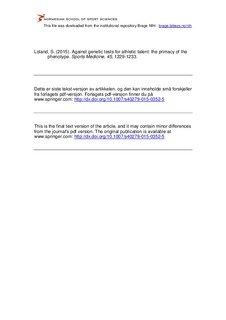| dc.contributor.author | Loland, Sigmund | |
| dc.date.accessioned | 2016-06-29T10:10:24Z | |
| dc.date.available | 2016-06-29T10:10:24Z | |
| dc.date.issued | 2015-09 | |
| dc.identifier.citation | Sports Medicine. 2015, 45,1229-1233 | nb_NO |
| dc.identifier.uri | http://hdl.handle.net/11250/2394563 | |
| dc.description | I Brage finner du siste tekst-versjon av artikkelen, og den kan inneholde ubetydelige forskjeller fra forlagets pdf-versjon. Forlagets pdf-versjon finner du på www.springerlink.de: http://dx.doi.org/10.1007/s40279-015-0352-5 / In Brage you'll find the final text version of the article, and it may contain insignificant differences from the journal's pdf version. The definitive version is available at www.springerlink.de: http://dx.doi.org/10.1007/s40279-015-0352-5 | nb_NO |
| dc.description.abstract | New insights into the genetics of sport performance lead to new areas of application. One area is the use of genetic tests to identify athletic talent. Athletic performances involve a high number of complex phenotypical traits. Based on the ACCE model (review of analytic and clinical validity, clinical utility, and ethical, legal and social implications) a critique is offered of the lack of validity and predictive power of genetic tests for talent. Based on the ideal of children’s right to an open future a moral argument is given against such tests on children and young athletes. A possible role of genetic tests in sport is proposed in terms of identifying predisposition for injury. If meeting ACCE requirements such tests could improve individualized injury prevention and increase athlete health. More generally, limitations of science are discussed in the identification of talent and in the understanding of complex human performance phenotypes. An alternative approach to talent identification is proposed in terms of ethically sensitive, systematic and evidence-based holistic observation over time of relevant phenotypical traits by experienced observers. Talent identification in sport should be based on the primacy of the phenotype. | nb_NO |
| dc.language.iso | eng | nb_NO |
| dc.publisher | Springer Verlag | nb_NO |
| dc.subject | athletic injuries/genetics | |
| dc.subject | *athletic performance | |
| dc.subject | dissent and disputes | |
| dc.subject | *genetic testing/ethics | |
| dc.subject | humans | |
| dc.subject | *phenotype | |
| dc.subject | risk assessment | |
| dc.title | Against genetic tests for athletic talent: the primacy of the phenotype | nb_NO |
| dc.type | Journal article | nb_NO |
| dc.type | Peer reviewed | nb_NO |
| dc.subject.nsi | VDP::Social science: 200 | nb_NO |
| dc.subject.nsi | VDP::Social science: 200::Social science in sports: 330 | nb_NO |
| dc.subject.nsi | VDP::Social science: 200::Social science in sports: 330::Other subjects within physical education: 339 | nb_NO |
| dc.source.journal | Sports Medicine | nb_NO |
| dc.identifier.doi | 10.1007/s40279-015-0352-5 | |
| dc.description.localcode | Seksjon for kultur og samfunn / Department of Cultural and Social Studies | nb_NO |
